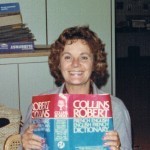Lucy Atkins's Blog, page 14
April 2, 2014
The Book that Changed My Life
 Last week I was asked to write a piece for Novelicious.com about The Book That Changed My Life. I wracked my brains for ages – thinking of things like Jane Eyre (the ultimate ‘chick noir’ novel, my all time favourite book that still brings me out in goosebumps) or Rebel Pony - yes really – a book I read 15 times aged ten – the book that got me hooked on reading.
Last week I was asked to write a piece for Novelicious.com about The Book That Changed My Life. I wracked my brains for ages – thinking of things like Jane Eyre (the ultimate ‘chick noir’ novel, my all time favourite book that still brings me out in goosebumps) or Rebel Pony - yes really – a book I read 15 times aged ten – the book that got me hooked on reading.
But then I realised that there is only one book that I can honestly say changed my life. It’s the book that made me believe I could be a writer. It’s the first place I saw my name in print. It’s been sitting on the shelves of every home I’ve ever lived in – so much part of the furniture that I don’t even notice it any more. I wouldn’t dream of reading it for pleasure. But I treasure it.
It’s The Collins Robert bilingual dictionary – written, painstakingly, over years and years, by my mum. The first edition was published 1978 (see her proud pic, left). I used to have to fight my way through index cards, stacks of paper, shelves and shelves of dictionaries to say hello to her when I got back from school each day. The family joke is that when The Dictionary was finally published, I was dim enough to be genuinely confused, since I thought ‘The Dictionary’ was a place in our house (‘mum’s at The Dictionary again’ or …’where’s mum?’ ‘The Dictonary’).
Here’s why it changed my life: Novelicious post

March 20, 2014
Ways to make an agent stop reading….
 Last night, I did an event at Blackwell’s Oxford with my literary agent, Judith Murray of Greene & Heaton. We wanted to demystify the process of getting your book published. I feel really strongly about this because, ten years ago when I was starting out (writing non-fiction) I found the world of literary agents and editors intimidating. It all seemed like a closed shop – a private member’s club – and I had no idea how to ‘get in’. So, to save others this paranoid ordeal, Judith and I sat down in a beautiful Oxford bookshop and busted some myths:
Last night, I did an event at Blackwell’s Oxford with my literary agent, Judith Murray of Greene & Heaton. We wanted to demystify the process of getting your book published. I feel really strongly about this because, ten years ago when I was starting out (writing non-fiction) I found the world of literary agents and editors intimidating. It all seemed like a closed shop – a private member’s club – and I had no idea how to ‘get in’. So, to save others this paranoid ordeal, Judith and I sat down in a beautiful Oxford bookshop and busted some myths:
Myth 1: ‘I don’t need a literary agent, I’ll just go straight to the editor/publisher’. Reality: You could, but your chances of getting an editor to actually read your book let alone buy it are teeny (unless they are a small publisher actively seeking submissions, which is rare). Agents save overburdened editors time. Editors trust good literary agents – they take their submissions seriously: ie. they read them!
Myth 2: ‘Agents get too many submissions, they don’t want mine too’. Reality: Agents are indeed inundated – Judith gets 30 submissions a day – but they do WANT to hear from you. Agents are always looking for the next talented, marketable writer.
Myth 3: ‘Even if I do send it to an agent it’ll probably go on a slush pile’. Reality: Judith looks at every single one of those 30 daily submissions. Every single one.
Myth 4: ‘Only people with literary connections get published, there’s no hope for an unknown like me even though my book is a work of genius’. Reality: Agents take on unknown writers all the time. It’s their job to spot talented writers. The key is how you approach them – if you put them off through an inept first approach you’re in the bin. As Judith says: ‘In some ways we’re looking for a reason to stop reading…’ Don’t give them that reason!
 Five quickest ways to make Judith stop reading your emailed submission:
Five quickest ways to make Judith stop reading your emailed submission:
Make spelling or grammatical errors
Write more than a paragraph or two in a waffly or clumsy style.
Use emoticons, different fonts or colours in your email.
Make inflated comparisons ‘I’m the next JK Rowling/Proust/Salman Rushdie’
Send a ten page synopsis or otherwise ignore the guidelines for submissions set out clearly on the agency website.
 And…five ways to catch Judith’s attention:
And…five ways to catch Judith’s attention:
Avoid all the pitfalls above
Be succinct, polite, clear and articulate
Mention any professional writing you’ve done – journalism, screenplays, documentary film making (that piece in the Church Gazette in 1998 doesn’t count)
Mention any prizes, awards, or competitions you have won or been shortlisted for (again, the Parish council short story comp isn’t quite enough, but the Bridport or another big short story prize would make her read on)
Briefly – one sentence – describe your novel, and mention where you think it fits the market without being inflated or mad (for instance, say something like ‘I’d probably put myself in a similar bracket to…’)
In short literary agents WANT to hear from you. You are not inconveniencing them by sending them your work. But they are extremely busy. If you make their job as easy as possible, by approaching them professionally and sticking to their submissions guidelines, then you’ll significantly raise the chances that your submission will be read and taken seriously.

February 24, 2014
How to Promote Your Writing: a quick masterclass
One thing I’ve learned since The Missing One was published in January, is that promoting your book is almost as hard as writing it. It can feel hideously uncomfortable to tweet about a good review, or ‘inform people’ on social media about sales or awards. It can feel truly cringe-worthy to put yourself ‘out there’ when fundamentally you’re most comfortable alone in a darkened room, with your laptop and no humans. But if, as a writer, you don’t do anything to promote your work, then the chances are (unless you’re Hilary Mantel) that it will sink without trace.
I came across Chris Hill, author of Song of the Sea God, on Twitter. I noticed he had a staggering 16.7 thousand twitter followers, a thriving blog and a serious social media presence, even though he has no mighty publicity department behind him (he is published by Skylight Press, a very small, niche publisher). How has he done this? He doesn’t seem like a lunatic self-promoter. And (as well as writing) he has a full time job. So, I asked him a few questions – which he kindly agreed to answer – because I can’t be the only writer wondering how to do this without going mad.
First, what’s your novel about? Hi Lucy, Song of the Sea God is about a man who comes to a small island off the coast of northern England and tries to convince the locals he is a god. In some ways it’s a book about the nature of religion – what it means to people, how it works. There’s humour in there, particularly in the narrative voice, but it’s quite dark and murky as well. Though it’s not well known, it’s becoming quite a cult book, and I’ve been delighted by the response I’ve had.
 Your Twitter presence is really strong. Should writers bother with Twitter? As a first time published author you start off basically invisible. Anything which can help you to become more visible has to be a good thing. Of course it takes time to build up followings on Twitter and Facebook, and Google+ and so on – all marketing takes time. But for most new writers unless you are willing to market your own work you are missing a real opportunity. I was a bit naïve in the beginning – I believed a publisher would do all that for me, but they have lots of books and no time. I soon realised if I didn’t help myself my book would tank – and I didn’t want that to happen.
Your Twitter presence is really strong. Should writers bother with Twitter? As a first time published author you start off basically invisible. Anything which can help you to become more visible has to be a good thing. Of course it takes time to build up followings on Twitter and Facebook, and Google+ and so on – all marketing takes time. But for most new writers unless you are willing to market your own work you are missing a real opportunity. I was a bit naïve in the beginning – I believed a publisher would do all that for me, but they have lots of books and no time. I soon realised if I didn’t help myself my book would tank – and I didn’t want that to happen.
Can you give us your top tips for increasing your twitter following? Follow people – then some of them will follow you back. It’s amazing how many people just expect followers to come to them. That might work if you are some sort of celebrity but not otherwise – you have to do the work and find them. Once you get bigger you seem to attract followers, like a snowball gets bigger rolling down a hill. But you have to push it to start it off. Also – have fun with it. I’ve found I love Twitter and social media generally – I’ve met some lovely people, and some lovely readers.
Your blog is also very popular: for those writing or thinking of writing blogs, what would be your tips for success? It helps to post on a regular day. And to try to give people something either useful to them or interesting to them – to repay them for giving you their time. If you can do that consistently you will build up a following over time. Also – it helps if you have decent followings on social media so you can ‘cross promote’ your blog. A basis of blog, Twitter, Facebook – what people call an author platform – can be quite a solid thing to build on.
How do you choose your blog topics? What have been the most popular ones?
When I worked for newspapers we used to talk about ‘news you can use’: stories that give people information they need. That holds true for blogging. If I answer the sort of questions you have asked here – what works on Twitter? what works on a blog? then I get lots of visitors. Of course, you also want to write about books and fiction, and the writing process. And write about your own book a little too. Being controversial helps as well – though I’m not by nature a controversialist. The most comments I ever received came when I criticised the ‘write a book in a month’ movement nanowrimo. And I got a lot of hits when movie star Nick Frost stopped by to add a comment criticising me (unfairly in my view) for being ‘a bit harsh’ to his mate Simon Pegg in one of my posts. It’s all about balance though – I don’t want to upset people, movie stars or otherwise, and I don’t want to spend all my time doing social media tips. I try to get the mix right.
Do you think people put too much emphasis on the big conventional publishers? I’ve written three books so far and only found a publisher for one. It took me a lot of time and a lot of rejection slips to find a publisher of any sort. Sea God is literary, quirky and outside the norm and I think big publishers, and the agents who feed them are looking for the next big seller – which is likely to be in the mould of the last big seller. Agents who have shown an interest usually say ‘Write me a thriller – one which obeys all the rules’. But it strikes me I’m better off trying to be the best I can be, than trying to turn myself into something I’m not. Publishing is changing – because of Kindle, obviously, but also digital printing technology, which has made it possible to print hard copy books more cheaply. So there are more small presses around and, of course, self-publishing has become a phenomenon.
You have a day job in communications – how do you make time to write? I do PR for WellChild, the national charity for sick children, and before that I worked in local newspapers for 20 years starting as a reporter and finishing as an editor. I’ve got a growing family too so I am busy – but I’ve always written round the day, at evenings and weekends. I carry a notebook around with me and scribble in it on the bus and so on. Once I’m properly working on a book I put in the hours in front of the keyboard in a more focussed way. I’ve written another novel that’s lighter, funnier and perhaps more commercial than Sea God, but I haven’t been able to find a home for it at the moment. I’m also working on a short story collection, which I’m hoping my current publisher might be interested in. I’ve written stories for years and won some prizes including the Bridport.
![Song of the Sea God visual[1]](https://i.gr-assets.com/images/S/compressed.photo.goodreads.com/hostedimages/1393378131i/8702755.jpg) Song of the Sea God is available on Amazon here (you can read the first few pages to get a feel for it) http://www.amazon.co.uk/Song-Sea-God-Chris-Hill/dp/1908011556/ref=sr_1_1?s=books&ie=UTF8&qid=1349468028&sr=1-1
Song of the Sea God is available on Amazon here (you can read the first few pages to get a feel for it) http://www.amazon.co.uk/Song-Sea-God-Chris-Hill/dp/1908011556/ref=sr_1_1?s=books&ie=UTF8&qid=1349468028&sr=1-1
Check out Chris’s ‘author platform’ for yourself on:
Twitter @ChilledCH. Facebook https://www.facebook.com/#!/chris.hill.3726 Blog at http://songoftheseagod.wordpress.com/

Hay & Psychologies Magazine
 The lovely Psychologies magazine has picked The Missing One to kick off its new Psychologies Magazine Book Club. Lucy will be talking about creativity and inspiration with Psychologies editor Suzy Greaves on Wednesday 28th May 2014 at the HowTheLightGetsIn2014 Festival at Hay-on-Wye. More details to follow.
The lovely Psychologies magazine has picked The Missing One to kick off its new Psychologies Magazine Book Club. Lucy will be talking about creativity and inspiration with Psychologies editor Suzy Greaves on Wednesday 28th May 2014 at the HowTheLightGetsIn2014 Festival at Hay-on-Wye. More details to follow.

Hay Festival & Psychologies Magazine
 The Missing One has been chosen as the first book pick for Psychologies Magazine’s new Book Club. Lucy will be talking about creativity and inspiration with Psychologies editor Suzy Greaves on Wednesday 28th May 2014 at the Hay Festival. More details to follow.
The Missing One has been chosen as the first book pick for Psychologies Magazine’s new Book Club. Lucy will be talking about creativity and inspiration with Psychologies editor Suzy Greaves on Wednesday 28th May 2014 at the Hay Festival. More details to follow.

January 20, 2014
What’s The Missing One About?
A short description of the novel in a video interview:

January 16, 2014
How to write a novel video
Talking about the process of finding a literary agent and revising a manuscript

Publish – then let go?
The Missing One is published today, and I’m thinking about an email I had this week, from a well-known writer – a woman whose work I admire enormously. She sent congratulations and then she said that she really felt for me right now, because publishing a novel can actually be quite daunting. In fact, she went on, warming up somewhat, ‘there’s nothing worse than having a book out (except of course, to paraphrase Oscar Wilde, not having a book out).
I love this honest appraisal of a longed-for situation. I could not possibly – not ever – complain about seeing my novel on the bookshelves. But it’s true, this feeling is not as straightforward as I’d imagined.
I’ve published non-fiction books before but this feels different. Seeing The Missing One in print feels like the end of a huge, and complicated journey (or maybe – if the email from this writer is to be believed – the beginning of one?). And it is definitely a bit disconcerting that this thing, which has been incubating in my head for so long, is now actually going to be out there – being loved or loathed, talked about, or (worse still!) ignored.
This summer I went to the South Bank Center to hear Elizabeth Gilbert (of Eat, Pray, Love fame) talk about her writing career. She was smart and funny and wise. Someone asked her what she felt about writing a novel after Eat, Pray, Love, and she sort of shrugged, and said, ‘Well, you have to send it out there and then you have to just let it go. You can’t control how people respond. It’s nothing to do with you any more’. She’s right of course, the only way to do this without going totally bonkers is to try to let it go. But I’m guessing that level of detachment might be easier to achieve if you already have a multi-billion dollar blockbuster under your belt….
Beautiful pacific northwest image copyright Peter Harris.

December 18, 2013
How to get a literary agent
 It’s almost exactly a year since my literary agent, Judith Murray of Greene & Heaton, called to say she’d got me a two book deal with Quercus. Judith has been an incredible source of support, information and skill (both practical and editorial). I’m very lucky I found her. Finding a good agent is really vital for any writer. So, this week, we filmed an interview together, aiming to demystify the process – and with luck, save people some time and anguish.
It’s almost exactly a year since my literary agent, Judith Murray of Greene & Heaton, called to say she’d got me a two book deal with Quercus. Judith has been an incredible source of support, information and skill (both practical and editorial). I’m very lucky I found her. Finding a good agent is really vital for any writer. So, this week, we filmed an interview together, aiming to demystify the process – and with luck, save people some time and anguish.
When you’re starting out, with no contacts, getting an agent can seem like a hopeless quest. People often ask whether they really need one anyway. Well, yes, you do. Without an agent it’s extremely hard to get your book published (basically, you’d have to self-publish it first, then somehow sell a ton of copies to get a mainstream publisher interested). A good agent like Judith has strong relationships with editors at publishing houses. They trust her judgement. If she sends them a novel, they will definitely read it. Your agent, then, is your hotline to the editor who will offer you a publishing deal. Editors don’t have time to read unsolicited manuscripts – but they do have time for good agents.
There’s the small matter of writing a really good novel, of course, but even good novels can get overlooked by agents. So, how do you make sure yours isn’t? Do you carpet-bomb fifty agents with your unfinished manuscript? Do you send them the whole book or just a ‘teaser’? Do you find out where they live and stalk them? Here are short versions of Judith’s answers to some key questions.
Q: How do I choose which agents to approach?
A: Look in the acknowledgements pages of the novels you love or admire, especially ones that appeal to the kind of readers you would like for your own book. If authors think their agents have done a good job for them, they often thank those agents in the acknowledgements pages – and from this you can draw up a shortlist of agents you want to approach.
Q: What sort of novels do you want?
A: I want a combination of powerful writing and story-telling that grabs my attention and holds it. I want a book that makes me miss my tube stop (The Missing One did that, and that’s how I knew it was for me).
Q: How do I get you to read mine though? Should I phone to tell you about it first, or do something else to make you read it?
A: Phoning doesn’t help. Nor do gimmicks like coloured paper or funny fonts. It’s all about the writing. I get up to 30 submissions every week, but I look at every one of them. If you are a journalist or someone else who writes or tells stories in other media (eg documentary or film maker) and/or if you have done a creative writing course, do mention that in the first paragraph of the covering email you send with your submission – that will make your submission stand out for me.
Q: So do I just stick my novel in the post then?
A: No, don’t send the whole thing and do send the submission via email if possible (most agents have websites on which you can find our submissions guidelines). Lucy sent me a short email introducing herself, attaching the first three chapters of The Missing One, and a one page synopsis. This is exactly the right approach. If I am interested, I ask to see the rest of the book.
You’ll able to watch the full video interview online here in January. Judith and I are also doing some talks in the New Year (see Events) where we’ll expand on these questions, and talk more about the process of editing and revising your novel for publication. You may think that as an artist you should be above this sort of thing but the truth is that there are a lot of unpublished books out there. Knowing the basics can make all the difference.

December 12, 2013
Book Give Away: win a free copy of The Missing One!
To win a copy of The Missing One it’s a doddle, you just click on https://www.goodreads.com/giveaway/show/73928-the-missing-one before 9 January. There are also some early reviews of the novel on Goodreads.




